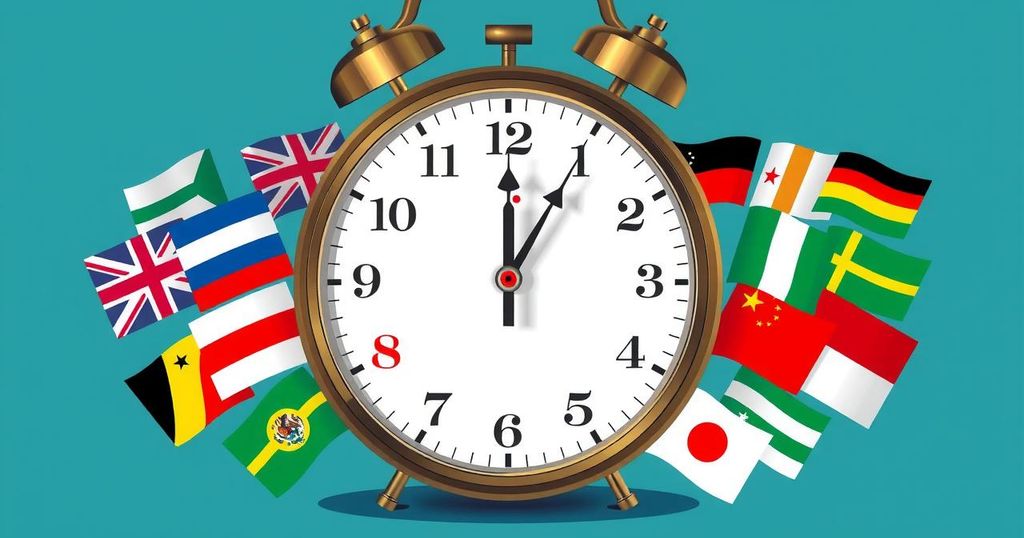Trump Issues Two-Month Ultimatum to Iran for Nuclear Agreement
President Trump has given Iran a two-month deadline to negotiate a new nuclear deal, warning of military consequences if they refuse. He has also demanded the cessation of Iran’s support for Houthi rebels in Yemen. Reports indicate Iran is advancing its nuclear weapon capabilities, raising concerns about regional and global security. The situation remains tense following discussions with allied leaders.
United States President Donald Trump has issued a stringent two-month deadline for Iran to finalize a new nuclear deal or face severe repercussions. In addition to this ultimatum, Trump has demanded that Iran cease its support of the Houthi rebels, who are viewed as a significant proxy terrorist group in Yemen.
In his correspondence delivered to Iranian Supreme Leader Ali Khamenei on March 7, Trump urged for direct negotiations concerning a new nuclear agreement. However, he also cautioned Iran about the dire consequences should they refuse this offer and continue their nuclear program, according to reports from Axios.
On the same day, while speaking to Fox Business, Trump acknowledged that the United States was “down to the final moments” in negotiations with Iran, expressing that interesting developments lie ahead. He indicated that failure to reach an agreement could lead to military confrontations with Iran.
Trump’s letter, perceived as robust in nature, was delivered by his special envoy, Steve Witkoff, directly to UAE President Mohammed Bin Zayed, and was subsequently relayed to Iranian Foreign Minister Abbas Araghchi. Prior to its delivery, U.S. allies, including Israel, were informed about the serious nature of the letter.
This development followed a significant phone conversation between Trump and Russian President Vladimir Putin, who concurred on the necessity of preventing Iran from acquiring weapons capable of threatening Israel’s existence. The two leaders discussed strategies to mitigate potential future conflicts in the Middle East, emphasizing the importance of halting the proliferation of strategic weaponry.
Initially, Khamenei dismissed Trump’s correspondence, labeling it a “deception” aimed at discrediting Iran’s willingness to negotiate. However, the Iranian UN mission later stated they are open to discussions concerning potential militarization of their nuclear plans, albeit rejecting dialogue aimed at dismantling their peaceful nuclear program.
Trump has further pressured Iran through social media, demanding an immediate cessation of support for the Houthi rebels, insisting that without Iranian support, the group would be swiftly defeated. Additionally, he warned of significant consequences for Iran should the Houthis continue their aggression.
National Security Advisor Mike Waltz reiterated that Iran must dismantle its nuclear program to avoid a series of dire consequences. Meanwhile, Iran’s foreign ministry indicated that they are currently examining the letter and preparing a formal response.
In a separate incident, Trump stated he would hold Iran accountable for every hostile action taken by the Houthis, especially following attacks against the U.S. military in the Red Sea, making it clear that any future aggression would lead to severe ramifications for Iran.
Reports suggest that Iran’s nuclear weapon development has intensified, with advancements towards solid-fuel warheads capable of reaching over 1,800 miles. With ongoing projects at two main sites in Shahrud and Semnan, Iran’s capabilities appear increasingly alarming, potentially threatening regions across multiple continents. The Organization for Advanced Defense Research (SPND) is overseeing these advancements, developing missiles that could serve as launch platforms for nuclear warheads.
In summary, the urgency of negotiations between the United States and Iran has intensified, with Trump demanding an immediate response regarding Iran’s nuclear program and regional conduct. As geopolitical tensions escalate, the international community remains vigilant to the developments surrounding Iran’s nuclear ambitions and their implications for global security.
In conclusion, President Trump’s ultimatum to Iran represents a critical juncture in U.S.-Iran relations, emphasizing the need for renewed negotiations regarding nuclear capabilities and regional influence. The situation remains precarious, particularly with threats of military action and increasing nuclear developments from Iran, highlighting the intricacies of Middle Eastern geopolitics and the broader implications for international security. The coming weeks will be pivotal in determining the direction of this ongoing diplomatic challenge.
Original Source: www.the-sun.com




Post Comment